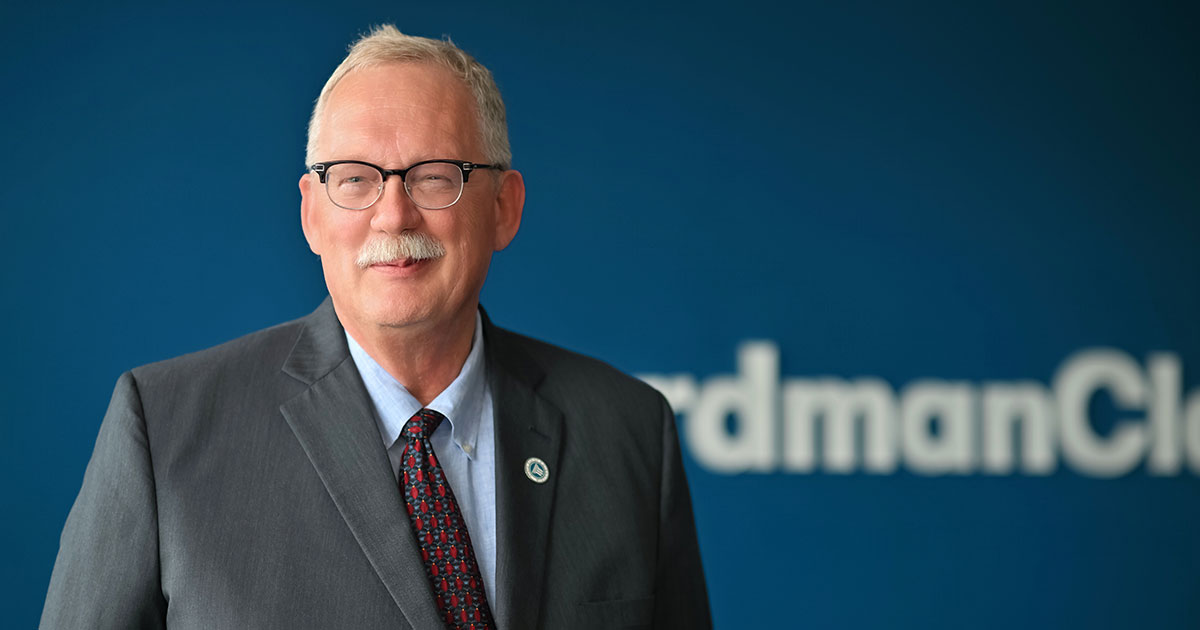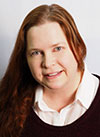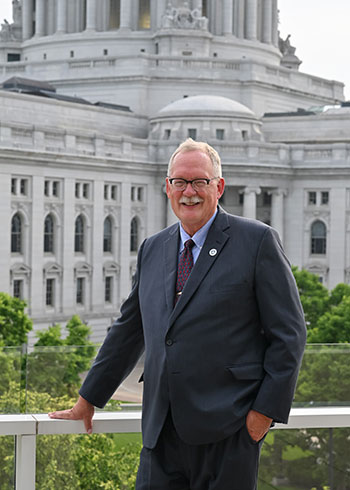
It wasn’t a courtroom victory or a big promotion that motivated Dan Gartzke’s drive to be a lawyer. It was a quiet moment as a young lawyer when his mentor, Dick Cates of Madison’s Lawton & Cates, walked into his office and asked him about his work.
Six months into practice, the work just wasn’t clicking. “He wasn’t yelling at me. … He was genuinely concerned,” Gartzke said.
Gartzke didn’t have an immediate answer, but it got him thinking. “I was questioning my path as a lawyer, and asking myself, ‘What am I doing here? Why am I doing it?’”
“I was confused,” said Gartzke.
Finding a job with Lawton & Cates as a clerk in law school gave him the focus to complete his studies. “I had a different career path planned for myself but once I started working in a law firm, with real questions and real clients, I found my purpose.”
Cates’ quiet concern “brought me back to why I had originally been attracted to law.” After more experience and reflection, “I found that I enjoyed the work,” Gartzke said.
“More importantly, I found people I enjoyed working with.” Part of that was Dick Cates’ honest concern for Gartzke as a person and a lawyer.
That moment underscored the importance of mentorship and set the tone for his career. Because in Gartzke’s world, it’s not just winning that defines a lawyer – it’s who helps you up and whom you help in return.
Now as he begins his year as State Bar president, he knows his balance: a busy career, with a home life on his farm raising sheep, restoring native prairie, tending the family wood lot, and making maple syrup.
Early Influences: Global Perspective and Local Roots
Gartzke’s father, Judge Paul C. Gartzke, was a Harvard-trained lawyer and WWII Navy veteran who served on the Wisconsin Court of Appeals, District IV, 1978-96.
 Shannon Green is communications writer for the State Bar of Wisconsin, Madison. She can be reached by email or by phone at (608) 250-6135.
Shannon Green is communications writer for the State Bar of Wisconsin, Madison. She can be reached by email or by phone at (608) 250-6135.
His mother, Waltraud, was a German immigrant who came to the U.S. after the war on a Fulbright scholarship to the University of Wyoming. Paul and Waltraud Gartzke settled in Madison.
Dan grew up on Madison’s near westside, attended Randall Elementary School and then West High School, and began college at Michigan State University before returning to U.W.-Madison.
His decision to become a lawyer was not entirely because of his father: Dan hoped to join the foreign service after he traveled extensively in Germany and Poland, teaching English from 1981 to 1983 in Bremen, West Germany, before law school.
It was a clerkship after his 1L year – with Lawton & Cates – that convinced him to practice law in Wisconsin.
Walk-Ins Welcome
After law school, Gartzke met Tracey Schwalbe, who is now an attorney with the Wisconsin Labor & Industry Review Commission in Madison. They married in 1990 and together raised three children.
Schwalbe shares Gartzke’s commitment to mentoring and has mentored several students and attorneys herself. She is also the past president of LAW (Legal Association for Women).
Gartzke’s career has been a circuitous path, going from clerk to associate, solo practitioner, small-firm founder, large-firm lawyer, and mentor. He practiced law in Madison and in New Glarus, eventually co-founding a small firm with Schwalbe in 2001.
Gartzke’s years practicing in New Glarus highlighted the distinct nature of small-town law. “Being a small-town lawyer – there is nothing like it,” he said.
At its core, the job is about solving problems. “You sit in your office, and people walk in. They will say, ‘I have a problem – can you help me?’ I got some of my best and most interesting cases that way.”
Even though he was based in the southern Wisconsin town of New Glarus, Gartzke’s practice took him across the state. “I’ve had cases in about one-third of Wisconsin’s 72 counties, up to Bayfield, Wausau, Sheboygan, and La Crosse to name a few.”
Gartzke now practices family law in Madison with Boardman & Clark LLP, the same firm as former State Bar president (2004-05) and incoming American Bar Association president Michele Behnke. His prior work experiences taught him a broad perspective and a deep appreciation for the legal profession. “My life has been richer for it,” said Gartzke, who continues to have a multicounty practice.
A ‘Commonsensical Approach’

Photos: Tatiana Shirasaki Photography
In the early 1990s, Gartzke joined what would become Duxstad, Vale, Bestul, and Gartzke in Monroe, where he became good friends with then-partner Thomas Vale.
In 2009, Vale was elected to the circuit court in Green County – in a campaign that included Gartzke as a contender.
“Along with a third candidate, we made promises to run positive campaigns for ourselves, not trying to attack the others,” said Judge Vale, now retired after two terms on the bench.
“We kept our campaigns positive and preserved our friendship, and Dan and I have remained friends through the years.”
Recalling working with him in the 1990s, Judge Vale said, “Dan was professional and respectful in his relationships with the other lawyers and staff but also had a ready sense of humor that helped create a comfortable working environment.”
“I was always happy to be associated with Dan and my other partners. I suppose it is telling that the partners elected to socialize outside the office because they wanted to, they didn’t have to,” he said.
Gartzke is a “great choice” for State Bar president, Judge Vale said. “Dan is a good lawyer who is not ego driven. He is grounded, has integrity, and cares about justice being served. He treats lawyers and litigants with respect. His calm demeanor and interpersonal communication skills help facilitate resolution in cases.”
“He has a wealth of legal and practical experience and the right personality to navigate the challenges of serving in that office,” Judge Vale said.
Tom Glowacki, who retired from his family law practice with Hill Glowacki, Madison, in 2015, met Gartzke early in his career.
They were on opposite sides in a particularly memorable divorce case. “I was the guardian ad litem,” Glowacki recalls. “Dan’s client was … kind of out of control.”
“Dan did what he is good at: keeping an objective view of his client and the problems he was creating, while still doing a good job for this client. He kept the case under control and moving along, a difficult job to do. A very commonsensical approach.”
Through the years, their relationship built on both formal and informal interactions. “He’s got a sense of humor with an edge to it. I’ve never seen him lose his temper when other lawyers would have,” Glowacki said. “We still get together for lunch and kick around ideas.”
Mentorship in Action: From High School to the State Bar
For 19 years, Gartzke coached high school mock trial at New Glarus High School, mentoring the students on the team. “I loved it,” he said.
“We had great experiences with the kids. Out of a high school of about 300 students, we’d get 20 kids coming out for the team. Some of the students were high achievers, but I was always drawn to those who were struggling yet kept with it. They reminded me about my own struggles as a lawyer initially, and I knew it was worth the effort to stick with it.”
Mentoring is his commitment.
His own winding career reflects the values of mentorship, adaptability, and a commitment to making a difference. “A mentor’s belief in us can shape the trajectory of our careers,” he said at his swearing-in ceremony on June 18, 2025. For more of his views on his own mentors, see “Dan Gartzke Sworn in as State Bar’s 70th President: ‘Mentorship Helps Us Now’,” in the June 19, 2025, issue of InsideTrack Weekly on WisBar.org.
Now as State Bar president, he is in a position to give back to the legal community in a meaningful way – as an opportunity to support mentorship and foster a welcoming environment for all attorneys.
He believes in the daily practice of informal mentoring, especially for attorneys from backgrounds that make it more challenging to join and stay in the legal profession.
He also encourages members not to forget about the State Bar’s mentorship and leadership programs, such as Ready.Set.Practice., which pairs mentors and mentees for a year, and the State Bar Leadership Academy – a comprehensive leadership development training program.
“These programs aren’t just about building better lawyers – they’re about strengthening the profession from the ground up,” Gartzke said. “The more support we give each other, the stronger we all become.”
As State Bar president, Gartzke plans to focus on cultivating connections, particularly across generational, geographic, and practice-type divides. His goals include supporting mentorship at all levels, encouraging civil and respectful discourse within the profession, and making sure all Wisconsin lawyers are seen, valued, and heard.
“The State Bar should feel like a place you belong,” he said. “Whether you’re in a big firm or practicing out of your home in a small town, you should know you are part of something larger.”
What Matters Most: The People, Not the Path
Gartzke’s advice on developing a legal career – as someone who has practiced at solo, small, and larger firms and who has run for judge – is to remember that every success, and every failure, gives you a new opening to follow. “I could not possibly have foreseen my path, but I have enjoyed the journey, and am happy with where and who I am,” he said.
“Welcome the opportunities of all life’s experiences and seek your mentors and opportunities to mentor others. You never know where it will take you. I wish you all as much satisfaction and joy as my career has brought me.”
» Cite this article: 98 Wis. Law. 14-17 (July/August 2025).
